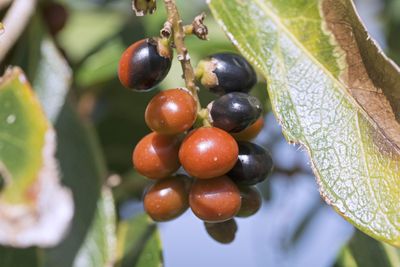Rumberry Info
Rumberries (Myrciaria floribunda) are not commonly seen in the United States, but Cuba, Guatemala, southern Mexico, Brazil, and many other warm region countries may have small pockets of the plants. Guavaberry as food used to be more popular, but its use is not as common today. This is probably because there is little commercial value in the plants, and the fruits are so tiny and time consuming to harvest. Guavaberries are tiny fruits similar in size to blueberries. Berries start green but ripen to deep purple or orange, depending on variety. The texture is grape-like and each fruit has a single seed. The flavor is said to be sweet-tart with spicy notes. Fruits ripen in the fall months on trees 60 feet (18.5 m.) tall. Leaves are lance-shaped and branches are covered in downy, reddish fuzz. Flowers appear in clusters, white, lightly hairy with numerous prominent stamen. The tree has been introduced to Florida, Hawaii, Bermuda, and the Philippines, where it is a fruit of some note. It is slow to bear and can take up to 10 years to produce berries.
How Can You Eat Rumberries?
The berries are high in Vitamins C and B and considered to be detoxifying. They also contain the minerals phosphorus, calcium, and iron. Guavaberry as food is how the fruit is primarily used but it is also part of a celebratory liqueur in the Virgin Islands. The nation liquor on the Virgin Islands is guavaberry rum. Guavaberry rum is made of sugar, rum, spices, and the fruit. It is enjoyed during the holidays. It is also made into strong wine on the islands. In Cuba, the fermented beverage is made into “una bebida exquisite,” meaning an “exquisite beverage.” Many other rumberry recipes produce jams, jellies, and tarts. The slightly acidic but sweet taste pairs well with creamy items like ice cream. Fruits are also dried to preserve them for baking. A spicy, sweet chutney is made from the fruit as well. If you are looking for traditional healing uses for rumberries, there are several. Due to their detoxifying properties, they are used to treat liver ailments and as a general purifying syrup. Rumberries can last in the refrigerator for up to a week but are best used fresh.
